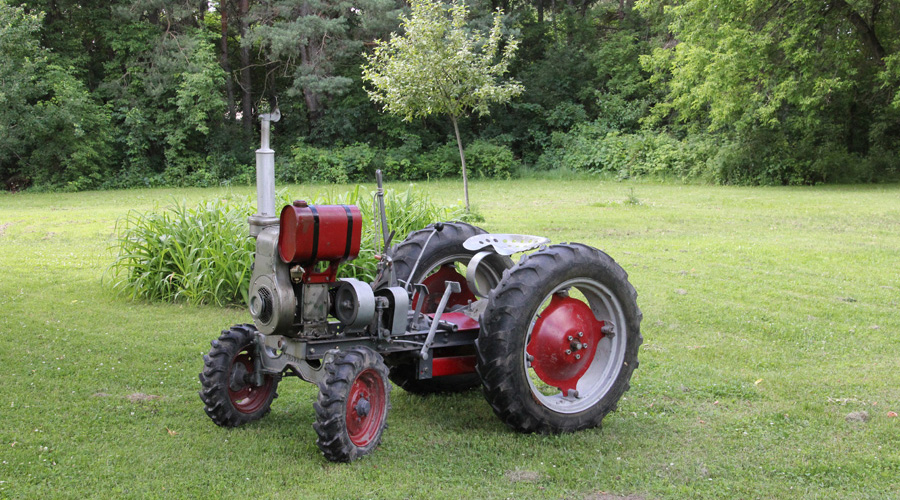Increase Software Team Innovation and Collaboration
How to Mitigate the Negative Effects of Endowment Bias

A few years ago, a friend of mine was moving to a new locality. In his effort to make his move easier, he decided to sell his tractor. It was a rather old and quite unique tractor. I'd expressed interest in it at one point, so he asked if I'd like to buy it. We haggled over the price a bit, but he needed to sell quick, and I'd already made up my mind on the maximum price I was willing to pay. In the end, I became the new owner of an old tractor.
A few days later, another friend was visiting, and noticed my "new" tractor. He was quite impressed! He inquired if I'd like to sell it. I told him that I wouldn't even consider it unless he paid me double what I'd just paid a few days earlier. It wasn't that I was interested in turning a quick profit. It was just that the few days of ownership had caused the tractor to become significantly more valuable to me.
I've often been fascinated by this phenomenon. It is utterly irrational. It wasn't as if during the brief ownership I'd discovered some unknown feature that made the tractor more valuable than previously imagined. If I were to find the identical tractor for sale today, I wouldn't pay a nickel more than I paid for the first one I bought. Yet, I have no interest in selling the one I own currently for twice the price. While I've always considered myself fairly rational, I've been somewhat mystified by this behavioral exhibit.
Endowment Bias Description
Endowment bias is the tendency for people to value an asset more when they hold the property rights to it than when they don't. This tends to be inconsistent with standard economic theory, which suggests that a person should be willing to part with something for the same price that they'd be willing to pay to acquire it. However, numerous studies have found that a person's minimum sale price of an item often exceeds the maximum that they be willing to pay for the same item.
One particular study conducted by J. L. Knetsch demonstrated the effects of endowment bias. The first study group consisting of 76 people were given a coffee mug. They were then asked to fill out a questionnaire indicating whether they preferred coffee mugs or candy bars. While the group was split 50/50 on their preferences between candy bars and coffee mugs, 89 percent of the students chose to keep the coffee mug when offered the chance to trade it for a candy bar.
The second group consisting of 87 people were first given a candy bar. They also took the questionnaire and were evenly split in their preferences between coffee mugs and candy bars. Yet when offered a chance to trade their candy bar for a coffee mug, 90 percent of the subjects chose to keep the candy bar.
Once again, it appears the mere act of owning an asset made it more valuable. To paraphrase the following quote from George Carlin
"Have you ever noticed that their stuff is garbage and your garbage is stuff?" - George Carlin
Practical Application in Software Development Teams
One of the most easily recognized areas of endowment bias in software development teams is in the inception and ownership of ideas. I have personally witnessed numerous cases of developers who were extremely excited about the value of a particular idea when they were the originator, yet when another developer expressed an idea of similar value, they were significantly less excited.
It quite common for developers to rate certain system functionality as more important to the overall health of the product if they happened to own that particular functionality. If you were to ask any employee what is the most important function of the organization, there is a good chance they'll mention the group or division that they happen to work in.
Endowment Bias Inhibits Innovation
A person's natural tendency to value their own work and ideas more than other's can significantly stunt an organization's ability to innovate. Listed below are some ideas to help mitigate this type of behavior.
- Brainstorming sessions with multiple participants - Brainstorming sessions can be a great way to overcome endowment bias. Often during these sessions, the ideas that are generated initially often end up in a somewhat unrecognizable form from the original idea. The final product often contains elements of numerous people's ideas. This allows everyone to feel some level of ownership for the idea, but reduces the level of endowment bias as the final product isn't the product of just one person's ideas.
- Make sure that one developer isn't the sole owner of a single functional area - Some of the nastiest pieces of code I've ever experienced were the result of a single developer having sole-ownership of a particular set of functionality. Not only is there very little oversight, but the sole developer may tend to over-estimate the value of their design and implementation. In one particular instance, I witnessed one developer making suggestions on how to improve another developer's implementation of a particular functionality set. Ironically, the design and implementation was quite similar to a piece of functionality that the reviewing developer had implemented a few months earlier. Allowing multiple developers to own a particular functionality set helps developers from becoming emotionally attached to their implementations and ideas.
- Make sure you create an environment where ideas are challenged - As a leader of your team, you need to make sure that everyone should expect to have their ideas challenged. Your team needs to understand that the dialog should always be about the idea, and not about the person. Make sure your team understands that it is permissible and encouraged to also challenge your ideas as the team leader. Creating an environment where ideas are continually challenged will help your team to hold more loosely to their ideas, and create an environment where the best ideas naturally bubble up to the top.
- Ask how what you'd do different if you could start over - Often, once a particular technology choice is made, whether a platform, tool, or methodology, it's lifespan often exceeds its ability to outperform the alternatives. If you are beginning to suspect that there is a better way, ask what you'd do differently if you could start completely fresh. When the answer is something different than what you are currently doing, it's time to objectively analyze the true cost of implementing the particular change.
Creating a Deliberate Practice that Fosters Innovation
If you are interested in more tactical ideas to foster innovation, you can view this post about Creating a Deliberate Practice to Foster Innovation on Software Teams. This post explains in great detail a number of deliberate practices that will help spur innovation within your team. So often, leaders talk about the importance of innovation, but then don't invest in the practices that are necessary to produce it.
Are you interesting in creating an effective coalition to lead change in your software organization? Learn how to find the right people, create trust, and establish the vision. Then continue reading...







